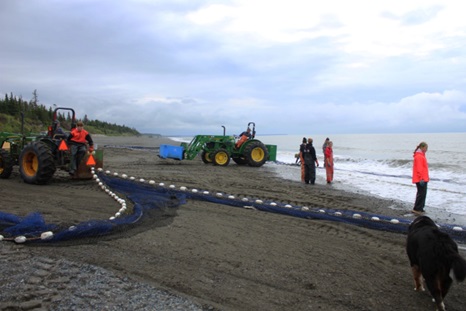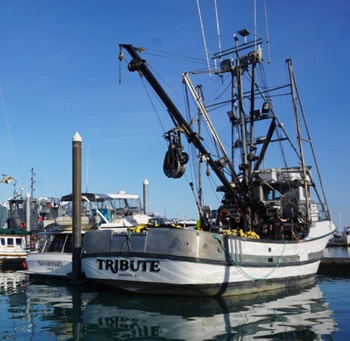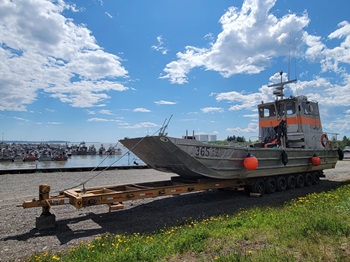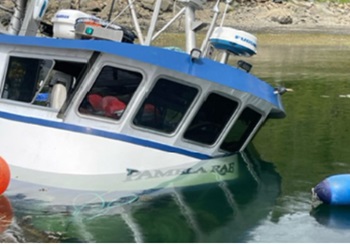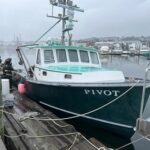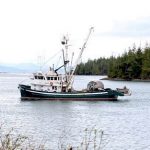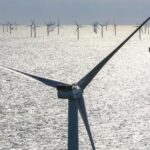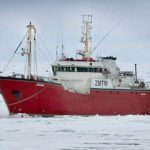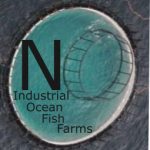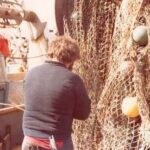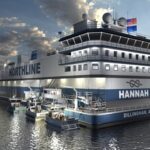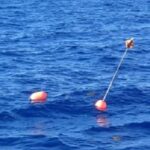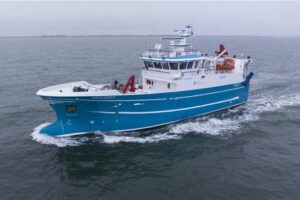Tag Archives: Alaska
Copper River harvest edges slowly towards1.4M
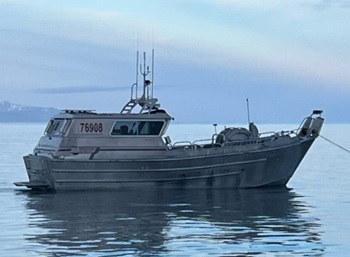 Harvests of Copper River District salmon edged up slightly to 1.4 million fish as of Tuesday, July 23, while for Prince William Sound overall the catch delivered to processors came to over 7 million fish, as the fishery slowed. Alaska Department of Fish and Game biologist Jeremy Botz in Cordova noted that fishing for coho salmon will pick up in mid-August. Meanwhile, Botz said, the sockeye harvest came in above forecast while the chum and likely Chinook catch would be below forecast. Consumers still hoping to purchase those prized Copper River reds likely won’t find them at their local seafood shops, but via the internet in a wide range of prices, some of which have not declined since the summer salmon season began. more, >>CLICK TO READ<< 11:40
Harvests of Copper River District salmon edged up slightly to 1.4 million fish as of Tuesday, July 23, while for Prince William Sound overall the catch delivered to processors came to over 7 million fish, as the fishery slowed. Alaska Department of Fish and Game biologist Jeremy Botz in Cordova noted that fishing for coho salmon will pick up in mid-August. Meanwhile, Botz said, the sockeye harvest came in above forecast while the chum and likely Chinook catch would be below forecast. Consumers still hoping to purchase those prized Copper River reds likely won’t find them at their local seafood shops, but via the internet in a wide range of prices, some of which have not declined since the summer salmon season began. more, >>CLICK TO READ<< 11:40
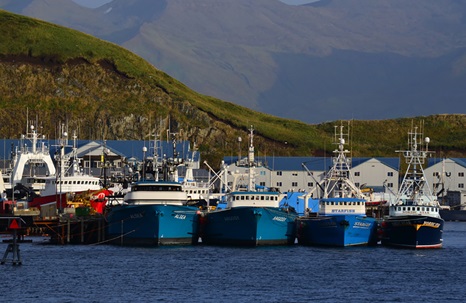
Biden administration rejects top Inslee choice for Alaska fish commission, reappoints trawl ally
The Biden administration has rejected a nominee for a key Alaska fisheries management post who could have tipped decisions toward the interests of tribes and conservation groups and away from the priorities of the large-boat, Seattle-based trawl industry. U.S. Commerce Secretary Gina Raimondo skipped over the top choice of Washington Democratic Gov. Jay Inslee, conservation advocate Becca Robbins Gisclair, and instead reappointed the last-ranked nominee on a slate of four candidates that Inslee offered: Anne Vanderhoeven, a trawl industry employee who has served on the panel for several years. Raimondo’s choice for the open North Pacific Fishery Management Council seat, which was confirmed Tuesday by Inslee’s natural resources advisor Ruth Musgrave, comes after what advocates describe as weeks of intense lobbying by supporters of both Gisclair and Vanderhoeven. more, >>CLICK TO READ<< 11:47
Illegal fishing shuts down Egegik district
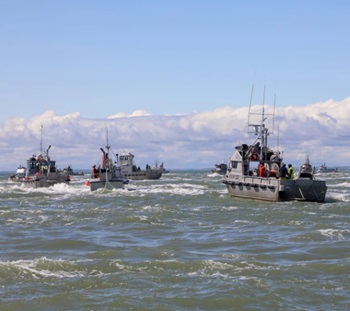 In Bristol Bay’s Egegik district, it’s not uncommon to see some boats illegally fishing over the line. But this year seemed particularly bad, according to the Alaska Department of Fish and Game. “We were receiving daily phone calls between Fish and Game and wildlife troopers, you know, multiple boats upwards of fifty at a time fishing outside of the district,” Tiernan said. That’s state biologist Aaron Tiernan. He says that during the peak of the season, extra Alaska State Troopers flood Bristol Bay from around the state. It’s a big effort. But as fishing winds down, the Alaska Department of Fish and Gamey start leaving to patrol other areas. “More and more reports come in. Because there’s less, there’s less enforcement going on overall. And we need to try to protect stocks that are going north and south or even into Egegik,” Tiernan said. So, in response, he decided to shut the fishery down. more, >>CLICK TO READ<< 14:39
In Bristol Bay’s Egegik district, it’s not uncommon to see some boats illegally fishing over the line. But this year seemed particularly bad, according to the Alaska Department of Fish and Game. “We were receiving daily phone calls between Fish and Game and wildlife troopers, you know, multiple boats upwards of fifty at a time fishing outside of the district,” Tiernan said. That’s state biologist Aaron Tiernan. He says that during the peak of the season, extra Alaska State Troopers flood Bristol Bay from around the state. It’s a big effort. But as fishing winds down, the Alaska Department of Fish and Gamey start leaving to patrol other areas. “More and more reports come in. Because there’s less, there’s less enforcement going on overall. And we need to try to protect stocks that are going north and south or even into Egegik,” Tiernan said. So, in response, he decided to shut the fishery down. more, >>CLICK TO READ<< 14:39
Kodiak crabber catches red king crab in Norton Sound, sparks public outrage in Nome
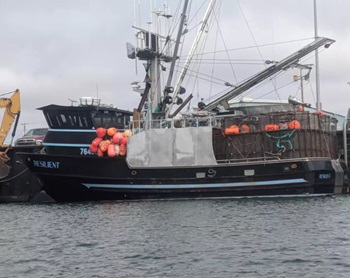 A limited amount of Norton Sound red king crab was for sale on the dock in Kodiak on July 19. This crab species is rarely available in this part of the state. And the Kodiak commercial fisherman who legally caught the king crab is facing some pushback. Raymond May was born and raised on Kodiak Island and has been fishing in Alaska for 40 years. He also holds the salmon fisher’s seat on the Alaska Bycatch Review Task Force, as appointed by Governor Mike Dunleavy. May operates his own vessel, called the Resilient, which is labeled as a tender packer. May’s boat was spotted docked in Nome’s small boat harbor on June 18 and immediately sparked criticism on social media. more, >>CLICK TO READ<< 10:30
A limited amount of Norton Sound red king crab was for sale on the dock in Kodiak on July 19. This crab species is rarely available in this part of the state. And the Kodiak commercial fisherman who legally caught the king crab is facing some pushback. Raymond May was born and raised on Kodiak Island and has been fishing in Alaska for 40 years. He also holds the salmon fisher’s seat on the Alaska Bycatch Review Task Force, as appointed by Governor Mike Dunleavy. May operates his own vessel, called the Resilient, which is labeled as a tender packer. May’s boat was spotted docked in Nome’s small boat harbor on June 18 and immediately sparked criticism on social media. more, >>CLICK TO READ<< 10:30
Norton Sound Crab Season Ends Early Amidst Concerns Over Non-Regional Fishing Vessels
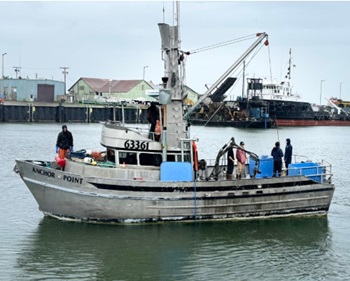 After only 28 days, the Norton Sound summer commercial Red King Crab season has come to a close. According to the Alaska Department of Fish and Game, this year’s season was just over half as long as the average run of 54 days from 1994 to 2023. For the 2024 season, Norton Sound was the only fishery in the country open for commercial Red King Crab harvesting. This is an attractive opportunity for fishing crews as the statewide commercial quota for the reputed “deadliest catch” is solely concentrated in the waters of Norton Sound. A boat at the center of recent public scrutiny is the F/V Resilient, owned and operated by Raymond May of Kodiak. more, >>CLICK TO READ<< 10:24
After only 28 days, the Norton Sound summer commercial Red King Crab season has come to a close. According to the Alaska Department of Fish and Game, this year’s season was just over half as long as the average run of 54 days from 1994 to 2023. For the 2024 season, Norton Sound was the only fishery in the country open for commercial Red King Crab harvesting. This is an attractive opportunity for fishing crews as the statewide commercial quota for the reputed “deadliest catch” is solely concentrated in the waters of Norton Sound. A boat at the center of recent public scrutiny is the F/V Resilient, owned and operated by Raymond May of Kodiak. more, >>CLICK TO READ<< 10:24
Bristol Bay floating fish processor back at full capacity after fire
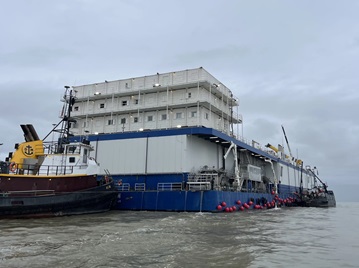 The Hannah, operated by startup Northline Seafoods, arrived in the region earlier this year. It uses super-cold spiral freezers to quickly freeze fish and then store them on board until the end of the season. But just before Bristol Bay’s salmon season hit its peak, one of those spiral freezers had an electrical fire. Because of the June 30 blaze, the Hannah has operated at reduced capacity for the last two weeks. On Wednesday, Northline announced that the freezer had been repaired. With that fix, the startup’s floating processing vessel is back to full capacity. “We definitely missed a few days of the peak, which we can’t get back. But we intend to continue to buy hopefully into the fall here,” said Northline CEO Ben Blakey. more, >>CLICK TO READ<< 10:17
The Hannah, operated by startup Northline Seafoods, arrived in the region earlier this year. It uses super-cold spiral freezers to quickly freeze fish and then store them on board until the end of the season. But just before Bristol Bay’s salmon season hit its peak, one of those spiral freezers had an electrical fire. Because of the June 30 blaze, the Hannah has operated at reduced capacity for the last two weeks. On Wednesday, Northline announced that the freezer had been repaired. With that fix, the startup’s floating processing vessel is back to full capacity. “We definitely missed a few days of the peak, which we can’t get back. But we intend to continue to buy hopefully into the fall here,” said Northline CEO Ben Blakey. more, >>CLICK TO READ<< 10:17
Task force report identifies research needs to better understand Alaska salmon problems
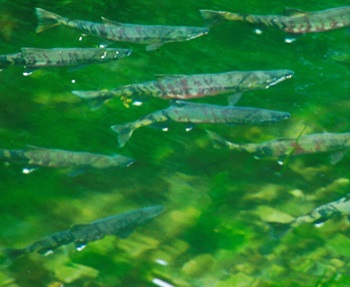 Fishery managers overseeing Alaska’s faltering salmon runs should be able to rely on a more comprehensive and holistic approach to science that considers all habitat, from the middle of the ocean to freshwater spawning streams far inland, according to a task force report on salmon research needs. The report was issued last week by the Alaska Salmon Research Task Force, a group established through a 2022 act of Congress to identify knowledge gaps and research needs. The task force comprises close to 20 members and includes scientists, fishers, Indigenous community representatives and agency managers. In addition to those members, the effort included a special 42-member working group focused on salmon problems in the Yukon and Kuskokwim River drainages. The report follows a year’s worth of meetings and consultations. more, >>CLICK TO READ<< 17:34
Fishery managers overseeing Alaska’s faltering salmon runs should be able to rely on a more comprehensive and holistic approach to science that considers all habitat, from the middle of the ocean to freshwater spawning streams far inland, according to a task force report on salmon research needs. The report was issued last week by the Alaska Salmon Research Task Force, a group established through a 2022 act of Congress to identify knowledge gaps and research needs. The task force comprises close to 20 members and includes scientists, fishers, Indigenous community representatives and agency managers. In addition to those members, the effort included a special 42-member working group focused on salmon problems in the Yukon and Kuskokwim River drainages. The report follows a year’s worth of meetings and consultations. more, >>CLICK TO READ<< 17:34
U.S. Gulf of Mexico Shrimp Fishery Achieves RFM Certification
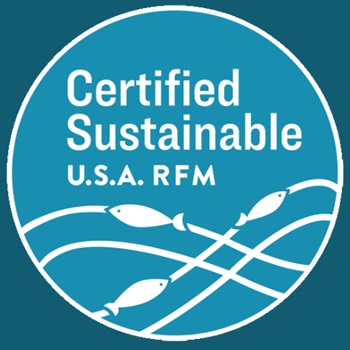 The Certified Seafood Collaborative (CSC) is pleased to announce that the U.S. Gulf of Mexico shrimp fishery (white, brown, and pink shrimp) for all five Gulf states and federal waters has achieved Responsible Fisheries Management (RFM) Certification. This is the first shrimp fishery certified to the RFM Standard. RFM Certification requires fisheries meet RFM Standard criteria which evaluate fisheries in four key areas: A) the fisheries management system; B) science and stock assessment activities, and the precautionary approach; C) management measures, implementation, monitoring, and control; and D) serious impacts of the fishery on the ecosystem. Third-party certification body Global Trust awarded the certification after a thorough evaluation of the Gulf of Mexico Shrimp fishery as reported in the Final Assessment Report. more, >>CLICK TO READ<< 06:16
The Certified Seafood Collaborative (CSC) is pleased to announce that the U.S. Gulf of Mexico shrimp fishery (white, brown, and pink shrimp) for all five Gulf states and federal waters has achieved Responsible Fisheries Management (RFM) Certification. This is the first shrimp fishery certified to the RFM Standard. RFM Certification requires fisheries meet RFM Standard criteria which evaluate fisheries in four key areas: A) the fisheries management system; B) science and stock assessment activities, and the precautionary approach; C) management measures, implementation, monitoring, and control; and D) serious impacts of the fishery on the ecosystem. Third-party certification body Global Trust awarded the certification after a thorough evaluation of the Gulf of Mexico Shrimp fishery as reported in the Final Assessment Report. more, >>CLICK TO READ<< 06:16
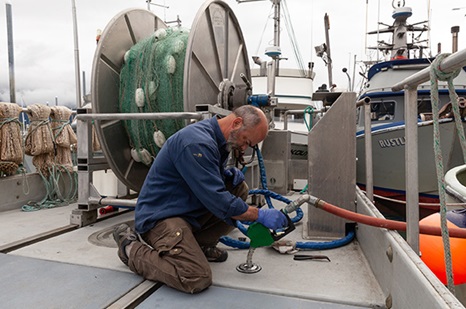
Salmon disaster relief applications for permit-holders due August 24
Federal disaster aid is on the way for some commercial fishing permit-holders in Haines and throughout the state, though many may be too wrapped up in the current season to apply for it right away. Applications for crew and subsistence users are currently available online. Unique applications for permit-holders and processors from the Pacific States Marine Fisheries Commission were mailed out on June 26 and are due August 24. Once completed the application can be mailed back to the commission or uploaded online. There’s also aid for vessel crew, and those applications are not due until September 28, but they may be harder to find. They’ll also need an affidavit from the permit holder or vessel owner they worked with to apply. more, >>CLICK TO READ<< 07:10
Local fishermen report mixed results in commercial season so far
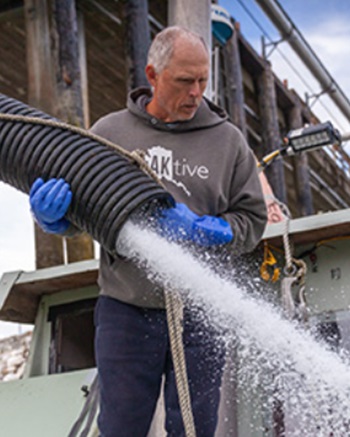 Nearly a dozen commercial fishing boats queued for gas and ice at the fuel dock on a foggy Saturday morning. The low tide set the pace slow enough for fishermen to talk to one another about the season even though they were eager to get underway. Boats bobbed up and down with names like Easy Street, Rustler, High Surf, Crown Haines, and Minnie A. Then the sun made its way through the morning clouds and the salty breeze carried the sounds of ice and fuel rolling through large plastic hoses hanging from the dock. It’s the third week since the season opener and fishermen like Matt Davis reflected on how the winds have shifted. more, >>CLICK TO READ<< 08:30
Nearly a dozen commercial fishing boats queued for gas and ice at the fuel dock on a foggy Saturday morning. The low tide set the pace slow enough for fishermen to talk to one another about the season even though they were eager to get underway. Boats bobbed up and down with names like Easy Street, Rustler, High Surf, Crown Haines, and Minnie A. Then the sun made its way through the morning clouds and the salty breeze carried the sounds of ice and fuel rolling through large plastic hoses hanging from the dock. It’s the third week since the season opener and fishermen like Matt Davis reflected on how the winds have shifted. more, >>CLICK TO READ<< 08:30
Ocean Wise pulls eco-labels from southeast Alaskan salmon
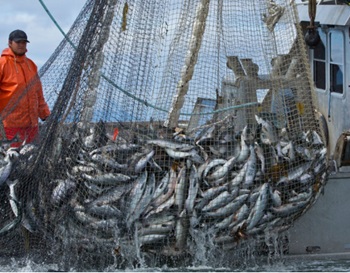 Canada’s largest sustainable seafood label has pulled its recommendation for southeast Alaskan salmon fisheries amid ongoing claims they are intercepting millions of B.C.-bound fish before they reach endangered southern resident killer whales. Ocean Wise quietly delisted the Alaskan fisheries last week, and on Monday, sent emails to restaurants and grocery chains that sell the fish. The decision, which targets chinook, chum, coho, pink and sockeye salmon in Alaska’s District 104, comes within weeks of the Vancouver-based eco-label adding a handful of B.C. salmon fisheries to its sustainable list. more, >>CLICK TO READ<< 11:47
Canada’s largest sustainable seafood label has pulled its recommendation for southeast Alaskan salmon fisheries amid ongoing claims they are intercepting millions of B.C.-bound fish before they reach endangered southern resident killer whales. Ocean Wise quietly delisted the Alaskan fisheries last week, and on Monday, sent emails to restaurants and grocery chains that sell the fish. The decision, which targets chinook, chum, coho, pink and sockeye salmon in Alaska’s District 104, comes within weeks of the Vancouver-based eco-label adding a handful of B.C. salmon fisheries to its sustainable list. more, >>CLICK TO READ<< 11:47
Horror on an Alaska fishing boat when a young crewman gets pulled into the sea
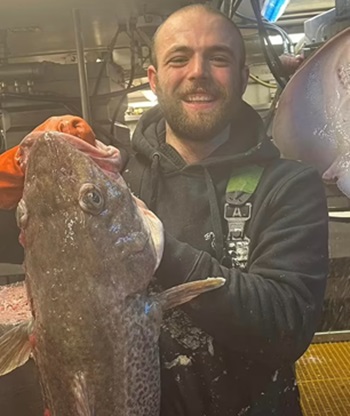 A 21-year-old fisherman died after his gear dragged him into the water in Southwest Alaska, officials said. Commercial fishing crewmember Corwin Wheeler fell from the boat in Kvichak Bay Friday, while fishing salmon. A mayday call reported him overboard at 12:31 pm, spurring a rescue operation. Officials said Wheeler first became tangled in his fishing gear, before being pulled overboard and into the water. Tributes have since poured in for the young angler, headed by his father. According to his social media, Corwin lived in Madison, and was born in Salem. Photos show him happily working the Bering Sea, as a salmon fisherman for Alaskan Leader Fisheries. Photos, more, >>CLICK TO READ<< 14:10
A 21-year-old fisherman died after his gear dragged him into the water in Southwest Alaska, officials said. Commercial fishing crewmember Corwin Wheeler fell from the boat in Kvichak Bay Friday, while fishing salmon. A mayday call reported him overboard at 12:31 pm, spurring a rescue operation. Officials said Wheeler first became tangled in his fishing gear, before being pulled overboard and into the water. Tributes have since poured in for the young angler, headed by his father. According to his social media, Corwin lived in Madison, and was born in Salem. Photos show him happily working the Bering Sea, as a salmon fisherman for Alaskan Leader Fisheries. Photos, more, >>CLICK TO READ<< 14:10
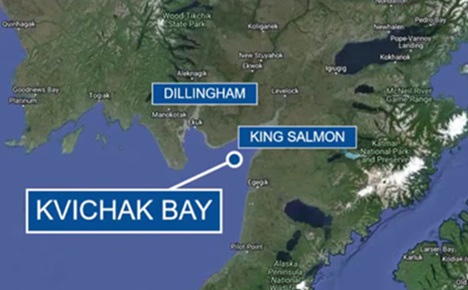
Crewmember on Bristol Bay fishing vessel dies following net entanglement
A commercial fishing crewmember in Western Alaska died Friday after he was swept up in fishing gear and taken into the water, according to the Alaska State Troopers. In a dispatch on Saturday, Troopers identified the victim as 21-year-old Corwin Wheeler of Wisconsin. Troopers began a rescue effort shortly after noon Friday upon receiving a mayday call from a fisherman in Kvichak Bay, a body of water near Naknek, part of the Bristol Bay Borough. more, >>CLICK TO READ<< 06:47
Electrical fire aboard the Hannah reduces Northline Seafood’s processing capacity
 A steady stream of frozen, whole fish emerges from a large spiral freezer. Each fish landing on a conveyor belt gets whisked away to the next stage in the production line. These frozen fish are some of the first sockeye salmon deliveries of the season from Bristol Bay fishing vessels to the Hannah — Northline Seafood’s brand-new floating freezer barge in the region. But on Sunday, June 30, an electrical fire under one of the Hannah’s freezers threw a wrench in that plan. According to Northline, the vessel’s team of marine firefighters were the first to respond to the incident and extinguish the fire. No one was injured. more, >>CLICK TO READ<< 08:45
A steady stream of frozen, whole fish emerges from a large spiral freezer. Each fish landing on a conveyor belt gets whisked away to the next stage in the production line. These frozen fish are some of the first sockeye salmon deliveries of the season from Bristol Bay fishing vessels to the Hannah — Northline Seafood’s brand-new floating freezer barge in the region. But on Sunday, June 30, an electrical fire under one of the Hannah’s freezers threw a wrench in that plan. According to Northline, the vessel’s team of marine firefighters were the first to respond to the incident and extinguish the fire. No one was injured. more, >>CLICK TO READ<< 08:45
Bristol Bay Fisheries Report: July 3, 2024
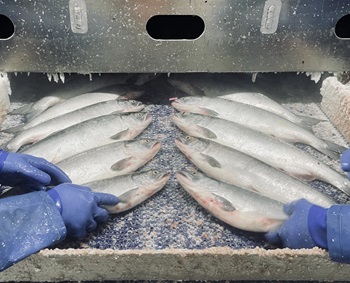 The baywide catch yesterday was 860,000, with over half of those fish coming from the Nushagak district. Egegik daily catch numbers more than doubled, with big average drift deliveries. Test fishery crews out at Port Moller report another day of increased catch indices, and say with those numbers, a larger and later run is more likely. An electrical fire damaged one of three spiral freezers aboard the Hannah on Sunday, June 30 2024. That’s Northline Seafood’s new floating processor, which is anchored in Bristol Bay’s Nushagak district this salmon season. The vessel is currently operating at a reduced capacity, although other processors are taking on some of Northline’s fleet. more, >>CLICK TO READ<< 10:14
The baywide catch yesterday was 860,000, with over half of those fish coming from the Nushagak district. Egegik daily catch numbers more than doubled, with big average drift deliveries. Test fishery crews out at Port Moller report another day of increased catch indices, and say with those numbers, a larger and later run is more likely. An electrical fire damaged one of three spiral freezers aboard the Hannah on Sunday, June 30 2024. That’s Northline Seafood’s new floating processor, which is anchored in Bristol Bay’s Nushagak district this salmon season. The vessel is currently operating at a reduced capacity, although other processors are taking on some of Northline’s fleet. more, >>CLICK TO READ<< 10:14
Copper River/PWS catch exceeds 1M salmon
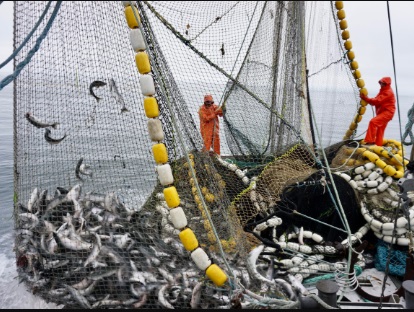 Commercial salmon harvests for the Copper River and the rest of Prince William Sound have now exceeded one million fish, including an estimated 959,946 sockeyes, in a season where retail prices continue to vary from $37.95 to $12.99 a pound. As more commercial fisheries opened statewide, Copper River, Bering River and Coghill district harvesters embarked June 24 on 36-hour commercial drift gillnet openers, and the Eshamy district began a 24-hour fishery. Commercial harvesters in the Unakwik, Montague and Southwestern districts were also fishing. As of late Monday, June 24, the salmon harvest in Prince William Sound stood at 973,000 sockeyes, 549,000 chum, 6,000 Chinook, and 1,000 pinks. Cook Inlet anglers had 42,000 sockeyes, and Bristol Bay districts — which are just getting started — had delivered 228,000 reds, bringing the Central Region total to 1.8 million fish, including 1.2 million sockeyes, 549,000 chum, 6,000 Chinooks, and 1,000 humpies. more, >>CLICK TO READ<< 19:12
Commercial salmon harvests for the Copper River and the rest of Prince William Sound have now exceeded one million fish, including an estimated 959,946 sockeyes, in a season where retail prices continue to vary from $37.95 to $12.99 a pound. As more commercial fisheries opened statewide, Copper River, Bering River and Coghill district harvesters embarked June 24 on 36-hour commercial drift gillnet openers, and the Eshamy district began a 24-hour fishery. Commercial harvesters in the Unakwik, Montague and Southwestern districts were also fishing. As of late Monday, June 24, the salmon harvest in Prince William Sound stood at 973,000 sockeyes, 549,000 chum, 6,000 Chinook, and 1,000 pinks. Cook Inlet anglers had 42,000 sockeyes, and Bristol Bay districts — which are just getting started — had delivered 228,000 reds, bringing the Central Region total to 1.8 million fish, including 1.2 million sockeyes, 549,000 chum, 6,000 Chinooks, and 1,000 humpies. more, >>CLICK TO READ<< 19:12
How a seagoing mentorship program trains ‘greenhorns’ and changes lives
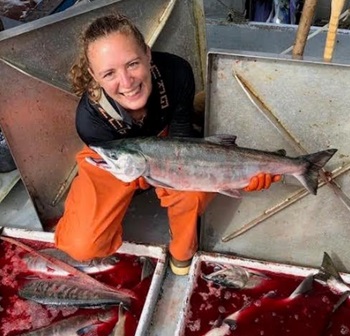 As a student at Vermont’s Middlebury College, Lea LeGardeur loved being on the water. Which proved an asset for LeGardeur, who, after teaching geography at Middlebury, decided to commercial fish in Alaska. LeGardeur’s break came when she discovered the Alaska Longline Fishermen’s Association, or ALFA, based in the small fishing town of Sitka, Alaska. The organization had an extensive record of fighting foreign fishing, trawling and depletion of resources. ALFA had recently secured a grant to fund its Crew Training Program, or CTP. The program was the brainchild of Karl Jordan, who suggested the concept to his father, Eric, shortly after Eric’s wife, Sarah, announced her decision to retire from fishing. Jordan père went on to propose the concept to Linda Behnken, the executive director at ALFA. Photos, Video, more, >>CLICK TO READ<< 07:50
As a student at Vermont’s Middlebury College, Lea LeGardeur loved being on the water. Which proved an asset for LeGardeur, who, after teaching geography at Middlebury, decided to commercial fish in Alaska. LeGardeur’s break came when she discovered the Alaska Longline Fishermen’s Association, or ALFA, based in the small fishing town of Sitka, Alaska. The organization had an extensive record of fighting foreign fishing, trawling and depletion of resources. ALFA had recently secured a grant to fund its Crew Training Program, or CTP. The program was the brainchild of Karl Jordan, who suggested the concept to his father, Eric, shortly after Eric’s wife, Sarah, announced her decision to retire from fishing. Jordan père went on to propose the concept to Linda Behnken, the executive director at ALFA. Photos, Video, more, >>CLICK TO READ<< 07:50
Petersburg seiner overturns in Anita Bay; one crew member injured
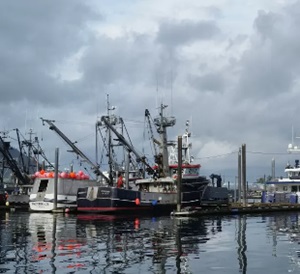 A Petersburg seiner overturned just south of Wrangell in Anita Bay at about 10 a.m. this morning. Multiple entities responded – the U.S. Coast Guard, U.S. Forest Service, and Wrangell Search and Rescue helped evacuate all five crewmembers aboard the 58-foot F/V Pamela Rae. The crew made it out unharmed, except for one person who sustained a minor injury. Lieutenant Matt Naylor, a spokesperson for the U.S. Coast Guard, said they don’t know what caused the Pamela Rae to overturn, but it could have been a mechanical problem. more, >>CLICK TO READ<< 06:05
A Petersburg seiner overturned just south of Wrangell in Anita Bay at about 10 a.m. this morning. Multiple entities responded – the U.S. Coast Guard, U.S. Forest Service, and Wrangell Search and Rescue helped evacuate all five crewmembers aboard the 58-foot F/V Pamela Rae. The crew made it out unharmed, except for one person who sustained a minor injury. Lieutenant Matt Naylor, a spokesperson for the U.S. Coast Guard, said they don’t know what caused the Pamela Rae to overturn, but it could have been a mechanical problem. more, >>CLICK TO READ<< 06:05
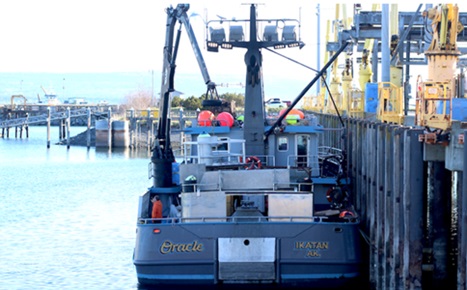
As salmon season kicks off, some Alaska fishermen fear for their futures
On a brilliant spring morning, Buck Laukitis, a longtime fisherman from this Kenai Peninsula town, stood at the city dock watching his catch come ashore. Crew members aboard Laukitis’ boat, the Oracle, filled bags with dozens of halibut — some of the fatter ones worth $200 or more — which a crane would lift up to the dock. There, processing workers on a small slime line weighed the fish, tossed crushed ice into the gills and slid them into boxes for shipment to Canada. Harvest, unload, sell, repeat — exactly how the iconic Alaska commercial fishing industry is supposed to work. Until you ask Laukitis about the Oracle’s sister vessel, the Halcyon. Instead of fishing for another species, black cod, like it’s built for, the Halcyon is tied up at the dock. For Laukitis to make money, processing companies would need to pay $2.50 for each pound of black cod delivered to a plant. But right now, buyers aren’t paying much more than $1.50, he said. With Laukitis on the dock last month were his young grandkids and adult daughters — fishermen who run a popular brand called the Salmon Sisters. Photos, more, >>CLICK TO READ<< 12:40
Copper River continues lead in PWS commercial salmon harvests
 With ice essentially gone from river systems, the sockeyes continued to weigh in heavier than through the same period a year ago, said fisheries biologist Jeremy Botz, in the Cordova office of the Alaska Department of Fish and Game. The Bering River and Coghill districts were also open for 36-hour commercial runs on Monday, and the Eshamy district for a 24-hour period. Montague District opened for purse seiners for 24 hours, and the Southwestern district for 48 hours, also for seiners. Even with other wild Alaska salmon fisheries opening for the season, Copper River sockeyes were holding their own in Anchorage restaurants, with entrees of Copper River reds offered at $49 at Simon and Seafort’s and $32 for the entree at Orso. more, >>CLICK TO READ<< 06:50
With ice essentially gone from river systems, the sockeyes continued to weigh in heavier than through the same period a year ago, said fisheries biologist Jeremy Botz, in the Cordova office of the Alaska Department of Fish and Game. The Bering River and Coghill districts were also open for 36-hour commercial runs on Monday, and the Eshamy district for a 24-hour period. Montague District opened for purse seiners for 24 hours, and the Southwestern district for 48 hours, also for seiners. Even with other wild Alaska salmon fisheries opening for the season, Copper River sockeyes were holding their own in Anchorage restaurants, with entrees of Copper River reds offered at $49 at Simon and Seafort’s and $32 for the entree at Orso. more, >>CLICK TO READ<< 06:50
Nearly $12 million headed to Alaska in latest infusion of fishery-disaster aid
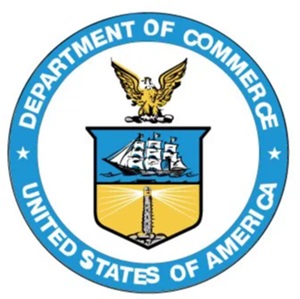 The aid money is for disasters declared for the 2022 chum salmon failure on the Kuskokwim River and the 2021-2022 sockeye salmon failure that affected Upper Cook Inlet setnet fishers. Aid for the Kuskokwim River disaster totaled $331,920, while aid for the Upper Cook Inlet sockeye disaster totaled nearly $11.5 million, according to the National Oceanic and Atmospheric Administration, which is a branch of the Commerce Department. Alaska is not the only state affected by poor salmon returns. Along with Friday’s announcement of aid for those affected by the Alaska salmon disasters, the Commerce Department announced $403,978 in aid for the Port Gamble S’Klallam Tribe’s 2021 Puget Sound fall chum and coho salmon fisheries in Washington state. more, >>CLICK TO READ<< 11:50
The aid money is for disasters declared for the 2022 chum salmon failure on the Kuskokwim River and the 2021-2022 sockeye salmon failure that affected Upper Cook Inlet setnet fishers. Aid for the Kuskokwim River disaster totaled $331,920, while aid for the Upper Cook Inlet sockeye disaster totaled nearly $11.5 million, according to the National Oceanic and Atmospheric Administration, which is a branch of the Commerce Department. Alaska is not the only state affected by poor salmon returns. Along with Friday’s announcement of aid for those affected by the Alaska salmon disasters, the Commerce Department announced $403,978 in aid for the Port Gamble S’Klallam Tribe’s 2021 Puget Sound fall chum and coho salmon fisheries in Washington state. more, >>CLICK TO READ<< 11:50
Market conditions continue to pressure seafood processors and fishermen
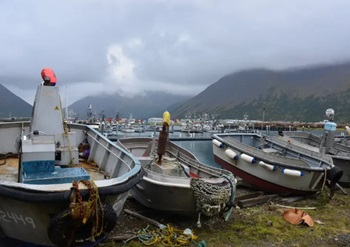 Consumers think of seafood as a premium purchase, which is not a good image when household budgets are tight and shoppers are worried about inflation. “The problem is not the fish,” said Jeremy Woodrow, executive director of the Alaska Seafood Marketing Institue. “The challenge is in the global marketplace.” Woodrow in February called the 2023 market for Alaska salmon “rock bottom” with low prices and weak demand, though maybe the industry was coming off that rocky bottom, he said then. Still, the pain is not gone. “A lot of buyers are barely holding on,” Woodrow said. “Our processors lost a lot of money the past year or two.” more, >>CLICK TO READ<< 09:40
Consumers think of seafood as a premium purchase, which is not a good image when household budgets are tight and shoppers are worried about inflation. “The problem is not the fish,” said Jeremy Woodrow, executive director of the Alaska Seafood Marketing Institue. “The challenge is in the global marketplace.” Woodrow in February called the 2023 market for Alaska salmon “rock bottom” with low prices and weak demand, though maybe the industry was coming off that rocky bottom, he said then. Still, the pain is not gone. “A lot of buyers are barely holding on,” Woodrow said. “Our processors lost a lot of money the past year or two.” more, >>CLICK TO READ<< 09:40
Gulf of Alaska trawl pollock vessels to be included in electronic monitoring program
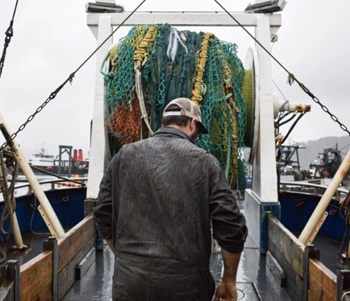 According to the 2023 annual report from the North Pacific Observer Program, the vast majority of groundfish harvest in Alaska is observed with full coverage, meaning 100% of all trips are monitored by either onboard observers or electronic monitoring. After years of testing the program, electronic monitoring will soon be expanded to include pelagic trawl pollock catcher vessels and tenders delivering to shoreside processors or stationary floating processors, across the Bering Sea and Aleutian Islands, and the Gulf of Alaska. That includes vessels that already have an observer on board. more, >>CLICK TO READ<< 07:55
According to the 2023 annual report from the North Pacific Observer Program, the vast majority of groundfish harvest in Alaska is observed with full coverage, meaning 100% of all trips are monitored by either onboard observers or electronic monitoring. After years of testing the program, electronic monitoring will soon be expanded to include pelagic trawl pollock catcher vessels and tenders delivering to shoreside processors or stationary floating processors, across the Bering Sea and Aleutian Islands, and the Gulf of Alaska. That includes vessels that already have an observer on board. more, >>CLICK TO READ<< 07:55
Area commercial harvest reaches over 438,000 salmon
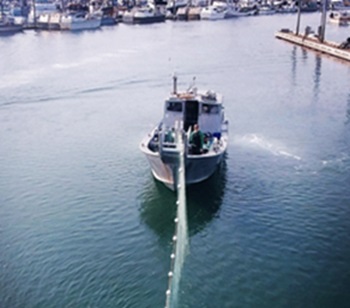 When state fisheries biologists shut down the Copper River commercial salmon for two 12-hour openers on June 3 and June 8 retail markets in Anchorage ran out of the popular Copper River fish, making way for the fresh catch of Cook Inlet sockeyes which were selling at $14.99 a pound. The decision to close those fisheries was that river waters were low and very cold, and the migration into rivers was running late, said Alaska Department of Fish and Game fisheries biologist Jeremy Botz, in Cordova. But then ADF&G opted to allow a 12-hour opener on Saturday, June 8, which brought in 338 deliveries with an estimated 74,296 sockeyes, 2,724 chum, 493 Chinook and 434 pink salmon. more, >>CLICK TO READ<< 07:40
When state fisheries biologists shut down the Copper River commercial salmon for two 12-hour openers on June 3 and June 8 retail markets in Anchorage ran out of the popular Copper River fish, making way for the fresh catch of Cook Inlet sockeyes which were selling at $14.99 a pound. The decision to close those fisheries was that river waters were low and very cold, and the migration into rivers was running late, said Alaska Department of Fish and Game fisheries biologist Jeremy Botz, in Cordova. But then ADF&G opted to allow a 12-hour opener on Saturday, June 8, which brought in 338 deliveries with an estimated 74,296 sockeyes, 2,724 chum, 493 Chinook and 434 pink salmon. more, >>CLICK TO READ<< 07:40
Remembering Ken Coleman, longtime commercial fisheries advocate
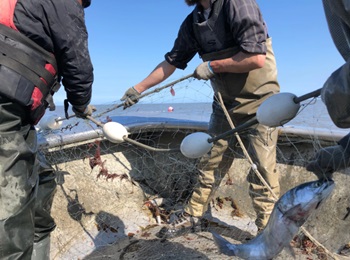 Ken Coleman, a longtime Kenai resident and commercial fisheries activist, died in his home May 7 at age 72. Anyone involved in Cook Inlet fisheries politics in the last 40 years probably either heard of or from Coleman. He was a staple presence at Cook Inlet Board of Fisheries meetings, always ready to put in a word for commercial set-netters, especially with the recent effort to create a permit buyback program. I’ve been at this now for 10 ten years on this reduction thing, the inception and where we are today. And I don’t know if I have another rodeo in me, if this doesn’t pass here,” Coleman said in an interview last year. Though recent years have been poor for setnetters, Coleman often talked about how he wanted the fishery to be available to his children and grandchildren. Coleman fished the beaches of Cook Inlet south of the mouth of the Kenai since the 1970s. more, >>CLICK TO READ<< 08:31
Ken Coleman, a longtime Kenai resident and commercial fisheries activist, died in his home May 7 at age 72. Anyone involved in Cook Inlet fisheries politics in the last 40 years probably either heard of or from Coleman. He was a staple presence at Cook Inlet Board of Fisheries meetings, always ready to put in a word for commercial set-netters, especially with the recent effort to create a permit buyback program. I’ve been at this now for 10 ten years on this reduction thing, the inception and where we are today. And I don’t know if I have another rodeo in me, if this doesn’t pass here,” Coleman said in an interview last year. Though recent years have been poor for setnetters, Coleman often talked about how he wanted the fishery to be available to his children and grandchildren. Coleman fished the beaches of Cook Inlet south of the mouth of the Kenai since the 1970s. more, >>CLICK TO READ<< 08:31
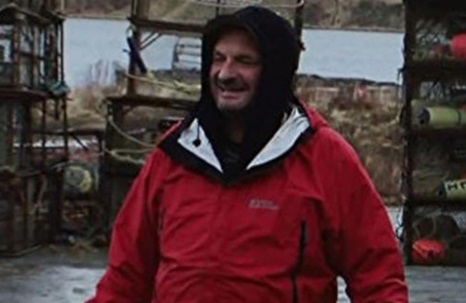
‘Deadliest Catch’ Fisherman Nick Mavar Has Passed Away – The Former Northwestern Deckhand Was 59
Nick Mavar, who appeared on Discovery Channel’s reality franchise Deadliest Catch, died Thursday in Naknek, AK, Bristol Bay Police Chief Jeffrey Eldie confirmed to Deadline. He was 59. Mavar suffered a medical emergency at a boatyard in Naknek Thursday afternoon, according to Eldie. Paramedics were called and he was taken to a local hospital where he was pronounced dead of what was determined to be natural causes, Eldie says. He was a familiar face to fans, given his status on the Northwestern, which is captained by the franchise’s de-facto elder statesman, Sig Hansen. Mavar was also uncle to onetime Northwestern greenhorn turned-deckhand turned-Saga captain, Jake Anderson. more, >>CLICK TO READ<< 18:10






